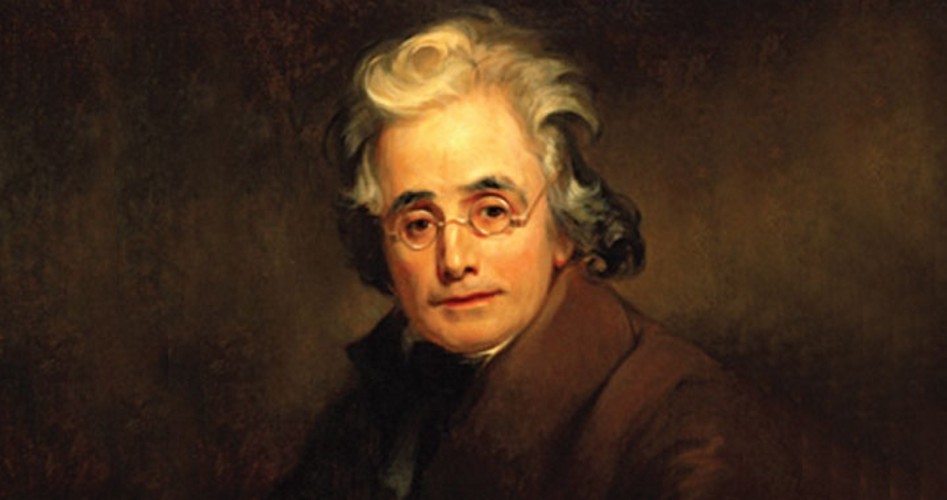Liberty’s Language
One morning in the spring of 1778, a young Frenchman, Peter Stephen Du Ponceau, was strolling through the woods at Valley Forge, Pennsylvania. Only 17 years old, Du Ponceau had arrived in America the previous year and, along with many others in the Continental Army, had endured the almost impossible hardships of the winter of ’77-’78 that had killed more than 2,000 soldiers in Washington’s army. No doubt weighed down by the terrible setbacks of that winter of discontent, Du Ponceau was surprised to hear, amid the chorus of spring birdsong, a rich operatic voice singing an aria from a well-known French opera. As Du Ponceau later recalled in a letter to a friend
I cannot describe to you how my feelings were affected by hearing those strains so pleasing and so familiar to me, sung by what seemed to me to be a supernatural voice, such as I had never heard before, and yet melodious and in perfect good taste. I thought myself for a moment at the Comédié Italienne, and was lost in astonishment, when I saw appear before me a tall Indian figure in American regimentals and two large epaulettes on his shoulders, my surprise was extreme
Du Ponceau approached the arresting figure, grateful to find someone able to speak his native French. The man informed him that he was an American Indian named Nia-man, of the Abenaki nation in French Canada. He had joined the American forces during the invasion of Canada early in the war, and had retreated with them to become a permanent enlistee of the Continental Army. Having received a Jesuit education, Nia-man was a cultured and literate man, and described himself as “bon Chrétien et bon Catholique.” He had risen in the ranks of the army and was now a colonel. Regarding his extraordinary musical talent, Du Ponceau was “convinced that, with a little more teaching, he would have been a valuable acquisition to the French Opera, where I had never heard a voice of such extraordinary power, at the same time susceptible of modulation.” Deeply impressed, Du Ponceau enjoyed breakfast with his new friend in the officer’s quarters, but never saw him again. But this, his first meeting with an American Indian, had a profound influence on his life, prompting this multitalented French-born son of the American Revolution to become one of the first Europeans to take a scholarly interest in the people now known as Native Americans
French Anglophile
Born Pierre-Étienne Du Ponceau in June 1760 at Saint-Martin on the Île de Ré, a small island on the coast of southwestern France, Peter Stephen Du Ponceau displayed early in life an uncommon aptitude for scholarship, especially linguistics. By the age of six, he had already learned Latin quite well, but the most important episode of his early childhood — one that would shape his destiny more than any other — was his discovery of an English grammar in a neighbor’s house. In the years before the Revolutionary War, English was scarcely studied on the European continent. French, German, and Italian were far more widely spoken, and their respective literatures more appreciated among continentals than anything written in English. But the language of the exotic land across the English Channel had a magnetic attraction for young Du Ponceau. “Child-like, I was delighted with the letters K and W, which my eyes had not been accustomed to see,” he wrote many years later. “I took the book home and began to study the English language. My progress was rapid.... I had a good ear and flexible organs. I soon spoke good English, and became a perfect Anglomaine.” Du Ponceau found opportunities to improve his English by speaking with English and Welsh residents on the island, and devoured the works of Milton, Shakespeare, Pope, and other great English writers — even, as he later admitted, to the neglect of many of the great writers of his native French.
JBS Member or ShopJBS.org Customer?
Sign in with your ShopJBS.org account username and password or use that login to subscribe.

 Subscribe Now
Subscribe Now
- 24 Issues Per Year
- Digital Edition Access
- Exclusive Subscriber Content
- Audio provided for all articles
- Unlimited access to past issues
- Cancel anytime.
- Renews automatically

 Subscribe Now
Subscribe Now
- 24 Issues Per Year
- Print edition delivery (USA)
*Available Outside USA - Digital Edition Access
- Exclusive Subscriber Content
- Audio provided for all articles
- Unlimited access to past issues
- Cancel anytime.
- Renews automatically


